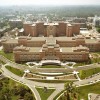
|
This year marks the 75th anniversary of the founding of the National Cancer Institute, the first so-called “categorical institute” of what has become the National Institutes of Health, with its 27 Institutes and Centers. Over the years, the Congress and the public have generously supported the NCI—and the NIH generally—with sustained budgetary increases. This was especially true for the NCI during the rapid expansion of its budget following the National Cancer Act of 1971 and for the NIH, including the NCI, during the five-year doubling of its budget, launched in 1998. Both of these eras of rapid growth were remarkably fruitful. The first launched the pursuit of cancer genes and the molecular basis of oncogenesis, laying the foundation for the transformation of clinical oncology that is now occurring. The latter accelerated the completion of the human genome project that now guides the study and control of all diseases, including cancers. Since 2003, however, the budgets of the NCI and the NIH have grown minimally, with their buying power shrinking by about 20 percent as a consequence of inflation. For more information click here. |
Doctor Profiles

|
Giuseppe Giaccone, MD PhD, National Cancer InstituteGiuseppe Giaccone, M.D., Ph.D. is an internationally recognized expert in the field of lung cancer and developmental therapeutics. Dr. Giaccone received his M.D. cum laude from the University of Torino Medical School in 1980, followed by training in clinical oncology … read more ❯ |
